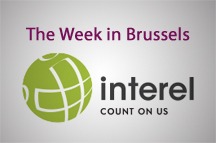 The news everyone in Brussels was dreading came true – Marks & Spencers were closing their revamped store less than two years after a major re-opening. The reality of Brexit was really hitting home now, hard on the heels of news that Theresa May would again not be invited to a meeting of the EU27 in the margins of the December European Council to discuss Europe’s future.
The news everyone in Brussels was dreading came true – Marks & Spencers were closing their revamped store less than two years after a major re-opening. The reality of Brexit was really hitting home now, hard on the heels of news that Theresa May would again not be invited to a meeting of the EU27 in the margins of the December European Council to discuss Europe’s future.
And that future looked even bleaker after the results of the US elections left EU leaders and MEPs fearing the worst on a range of international issues, from TTIP to the Paris climate agreement, which only came into effect last week. President of the European Council, Donald Tusk, saw the result as an opportunity for Europe to “finally get our act together and bring back a sense of direction”. EPP group leader in the European Parliament, Manfred Weber, continued the theme: “The message is clear: it is now up to Europe. We must be more self-confident and assume more responsibility”. An invitation has already been extended to the President-elect to come to Europe to discuss issues of mutual concern, such as climate change, migration, counter-terrorism and in particular “the threats to Ukraine’s sovereignty and territorial integrity”. Nobody is holding their breath for a speedy reply.
Where is the next Trump moment?
Following Brexit and the Trump triumph, Europe is looking for where the next political earthquake may come. They might not have to wait too long with the increasing likelihood that the far-right candidate will win the Austrian presidency race on December 4 and the same day the Italian Prime Minister Matteo Renzi could lose his constitutional referendum, possibly leading to his resignation. A Eurosceptic double whammy. It’s no surprise that Trump’s victory was most warmly celebrated by the next wave of insurgents in France, the Netherlands and Germany who all go to the polls next year. Nigel Farage welcomed it as a bigger shock than Brexit – and warned that there were more political shocks to come. He’s even put himself forward as the next US Ambassador to the EU to help “bring it down”.
Hands off our toasters
The UK may be on the way out of the EU but its tabloid press still seem to terrify Commission officials. New plans were launched this week to make a range of appliances, from kettles to hand dryers, more energy efficient. The Commission claims this could save every household €500 a year on energy bills and €55 billion for industry. The list was also supposed to include toasters and hair dryers but the Commission feared a public backlash against “meddling Eurocrats” following tabloid reactions to past efforts to govern the energy efficiency of vacuum cleaners. The sensitivity in the Commission was such that the proposal had been delayed until after the UK referendum.














